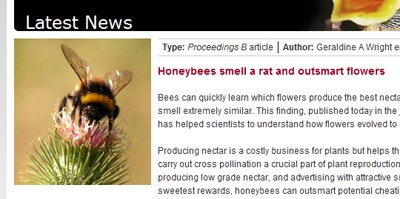 On the homepage of the Proceedings of the Royal Society? Really?
On the homepage of the Proceedings of the Royal Society? Really?
I expect this kind of screwup in, say, USA Today, but a major scientific society really ought to have someone on staff who can correctly identify a honeybee.
 On the homepage of the Proceedings of the Royal Society? Really?
On the homepage of the Proceedings of the Royal Society? Really?
I expect this kind of screwup in, say, USA Today, but a major scientific society really ought to have someone on staff who can correctly identify a honeybee.
I think this fail goes beyond taxonomy... have these people never been outside?
(Then again, it was probably about 2min before some deadline at 3 in the morning and the writer/website organiser/whatever had to think fast and slap something on there. Isn't that how things are usually done?)
Hey, at least it's not a syrphid right?
are you KIDDING me???? though given the accuracy of bee spotter, this is not surprising
WHY couldn't they just write "BEES smell a rat etc."
ARGH.
Bumblebee make honey, heh, heh.
My "bumbling" use of the qwerty keyboard sometimes renders me terribly inarticulate. Feel free to delete the first bit of blather.
Anyway, since they make honey, bumblebees are honey bees, if not honeybees. Or is it the other way around? http://roberto.kellerperez.com/2009/04/honeybee-or-honey-bee/
You should mention what these bugs actually are in these snarky taxonomy posts - in addition to why it's so significant that these bugs aren't honeybees. Otherwise it comes off as arrogant and incredibly out of touch with what is common knowledge. I'm have no doubt there are just as many misidentifications of mushrooms, sea slugs etc. that would be just as "obvious" to their local experts.
Matt-
I write for my audience. As far as I can tell from the site stats, comments and link data, the myrmecos blog readership is largely entomologically literate. I could step back and offer general explanations, but then the posts lose the entertainment value for the regular readers, in my opinion. It'd be like explaining why a joke is funny.
In any case, the mis-IDs on the recent taxonomy posts are both bumble bees (genus Bombus), mistaken for honey bees (genus Apis). The differences between the two are akin to the differences between a buffalo and a goat. Same family, but vastly different appearance.
Bumblebees tend to be several times heavier, more thickly proportioned, darker in color, and with longer hairs than honeybees. For an example, see here:
http://www.beekeeping.talktalk.net/westglambeekeeping/begin.htm
Lucky You!
All the traffic on my blog appears to be people looking for midget vampire gerbils.
But you've got the best midget vampire gerbils on the web. Where else are we supposed to go for those?